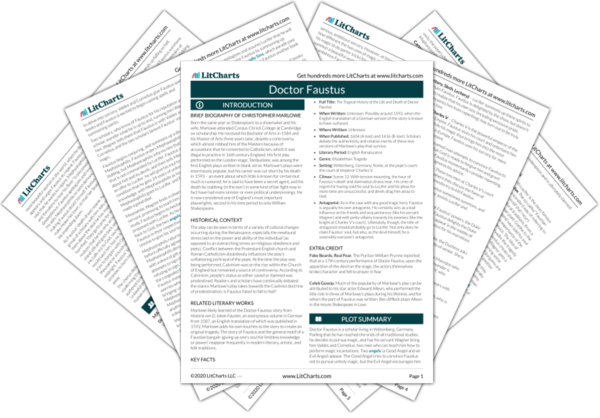Faustus is identified as a character by his status as a doctor (that is, someone with a doctoral degree), and the backdrop of much of the play is the university environment in which Doctor Faustus lives. It is thus no surprise that issues of formal education are of great importance to the play, in which even magic spells are learned from a kind of text-book. Systems of education obviously exist to help people learn, but Marlowe also explores the associations of formal education with power and social hierarchy. Education helps people position themselves in higher social classes. It is through education that Faustus rises from his humble origins and that the play's scholars differentiate themselves from lowly clowns like Robin and Rafe. And when Wagner promises to teach a clown magic, he uses his superior knowledge as a way to gain power over the clown, getting him to agree to be his servant.
But not everything can be learned in school and from books. In his opening soliloquy, Faustus rejects traditional areas of study and, although his magic does rely on a spell-book, what he seeks from Mephastophilis is knowledge that he can't attain in traditional ways. For the ambitious Faustus, even beyond the implications of educations affect on social hierarchy, knowledge means power. He desires limitless knowledge largely because of the massive riches and power that come with it. And indeed whatever power Faustus possesses with his magic is due entirely to his knowledge of certain magic incantations. This close connection between knowledge and power can be contrasted with the idea of knowledge for its own sake, which ideally characterizes learning in universities.
Ultimately, Marlowe's play suggests that there are limits to proper knowledge and education. The desire to learn is not inherently bad, but Faustus goes too far and seeks to know too much. He himself seems to recognize this, as his last line in the play contains a promise to burn his books (XIII, 113) and thus repudiate his ambition for learning. The chorus that delivers the final lines of the play sums up the moral of Faustus' story: “Regard his hellish fall, / Whose fiendful fortune may exhort the wise / Only to wonder at [i.e. be amazed at but don't seek to understand] unlawful things,” (Epilogue, 4-6). But even if this moral is clear-cut, where to draw the line between appropriate subjects of study and “unlawful things” that we shouldn't seek to know is unclear. Knowledge is power, but how much is too much?
Education, Knowledge, and Power ThemeTracker

Education, Knowledge, and Power Quotes in Doctor Faustus
...Till, swollen with cunning, of a self-conceit,
His waxen wings did mount above his reach,
And melting heavens conspired his overthrow.
For falling to a devilish exercise,
And glutted more with learning's golden gifts,
He surfeits upon cursed necromancy. (20-25)
Why then belike we must sin,
And so consequently die.
Ay, we must die an everlasting death.
What doctrine call you this? Che sara, sara
What will be, shall be! Divinity, adieu!
These metaphysics of magicians,
And necromantic books are heavenly! (44-50)
O Faustus, lay that damned book aside,
And gaze not on it, lest it tempt thy soul,
And heap God's heavy wrath upon thy head. (70-72)
How am I glutted with conceit of this!
Shall I make spirits fetch me what I please,
Resolve me of all ambiguities,
Perform what desperate enterprise I will?
I'll have them fly to India for gold,
Ransack the ocean for orient pearl,
And search all corners of the new-found world
For pleasant fruits and princely delicates. (78-85)
Philosophy is odious and obscure,
Both law and physic are for petty wits;
Divinity is basest of the three,
Unpleasant, harsh, contemptible, and vile.
‘Tis magic, magic that hath ravished me. (106-110)
Go bear these tidings to great Lucifer,
Seeing Faustus hath incurred eternal death
By desperate thoughts against Jove's deity:
Say, he surrenders up to him his soul
So he will spare him four and twenty years,
Letting him live in all voluptuousness,
Having thee ever to attend on me,
To give me whatsoever I ask,
To tell me whatsoever I demand,
To slay mine enemies, and aid my friends,
And always be obedient to my will. (87-89)
Thanks, Mephastophilis, yet fain would I have a book wherein I might behold all spells and incantations, that I might raise up spirits when I please. [...] Nay, let me have one book more, and then I have done, wherein I might see all plants, herbs, and trees that grow upon the earth. (163-173)
Why should I die then, or basely despair?
I am resolved! Faustus shall ne'er repent.
Come, Mephastophilis, let us dispute again,
And argue of divine astrology. (207-210)
One thing, good servant, let me crave of thee,
To glut the longing of my heart's desire:
That I might have unto my paramour
That heavenly Helen which I saw of late,
Whose sweet embracings may extinguish clean
These thoughts that do dissuade me from my vow:
And keep mine oath I made to Lucifer. (72-78)
Ugly hell gape not! Come not, Lucifer!
I'll burn my books—ah, Mephastophilis! (112-113)
Regard his hellish fall,
Whose fiendful fortune may exhort the wise
Only to wonder at unlawful things:
Whose deepness doth entice such forward wits
To practice more than heavenly power permits. (4-8)
















